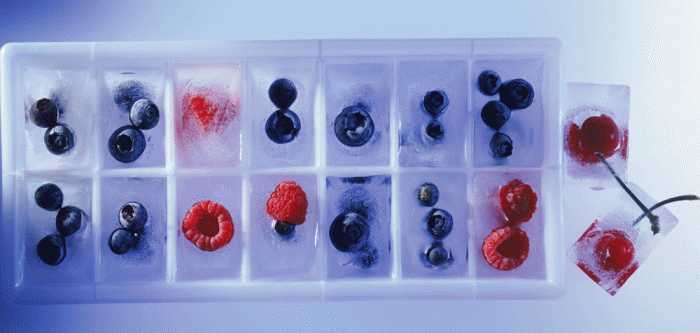
When many of us think of freezers, we think ice cream, TV dinners and other preservative-packed foods. But the drop in temperature means more opportunities. From eating healthier and locking in nutrients to saving money and time in the kitchen, freezing food is easy, convenient and healthy. We went to Registered Dietitian Nicolette Pace to learn the type of foods that will stay fresh when frozen.
Seasonal Fruits: Cut up and freeze seasonal fruits such as peaches, cantaloupe, honeydew melon, pineapple, grapes or apples for a year-round vitamin and fiber fix. They make for a great lunch paired with low-fat cottage cheese, a delicious fruit smoothie or a quick fruit cocktail. Add a spritz of lemon juice to your frozen fruits, and you’ll prevent browning while boosting vitamin C — a heat sensitive vitamin you won't find as much of in canned fruits.
Nuts: Healthy and expensive fats can turn rancid at room temperature, so protect your investment by storing them in the freezer. Bag up and freeze slivered almonds, pine nuts, honey toasted pecans or spicy Thai-style peanuts, as they’ll come in handy for artistic salads, whole grain pilafs, pesto, noodles and pasta dishes. In addition, they’ll provide a heart-healthy omega-3 kick to your meals.
Berries: Have local, fresh berries year-round by storing blueberries, blackberries, raspberries and strawberries in your freezer. Rich in vitamins and fiber, these low-carb fruit gems provide nutrients that will boost flavor, add rich color and bathe your blood cells with healing plant chemicals to hit you with super antioxidant power.
Bakery Fresh Bread: Impress guests by having fresh bread conveniently available at any time by storing artisan breads in the freezer. The cold temperature will preserve the crumb and texture while preventing staleness. Just a quick oven re-bake will bring back the aroma, crispness and moisture for fine-dining at home.
Semi-Soft Cheese: Freezing cheese slows down mold in super-melts like mozzarella, Colby, pepper jack or Gouda. By storing cheese fresh in your freezer, you’ll have the proper ingredients for last-minute dinners such as tacos, frittatas or veggie dishes.
Whole Grains: Whole grains like flax, quinoa, millet or oats deteriorate faster at room temperature than when kept cold. Ensure these vitamin and mineral rich carbohydrates stay fresh and available to work into your whole-food diet by freezing them in insulated bags to stay fresh.
Healthy Herbs: Fresh herbs, such as basil, parsley, mint, dill, cilantro and chives can benefit from a deep-freeze treatment. To retain their vibrant color, let herbs air-dry before freezing, or finely chop for a great start to a freshly made pesto, chutney, meat marinade, salad dressing or herb butter.
Vitamin C: Freshly squeezed citrus gets lost in bottled, pasteurized juices, so for a just-released surge of vitamin C and fresh flavor, freeze juiced lemons, limes, oranges and grapefruits. Store in ice-cube trays and use for a fresh splash on your fish, chicken or fruit salad, or infuse in fruit waters and teas.
Specialty Stocks, Stews and Sauces: Double or triple the quantity of homemade stock and freeze it for later use. Your own marinara, chili or mineral-rich stew can stay good for months in the freezer. And by making it yourself, you can control calories, fat and sodium while preparing a wholesome, preservative-free meal.
Farm Fresh Veggies: Seasonal local veggies are on top of the nutrient list, and by freezing them, you’ll preserve their vitamins, minerals, plant chemicals and fibers. You’ll also avoid consuming processed additives like sodium or sulfites. So when fresh, freeze asparagus, beets, broccoli, green beans, peas, carrots and greens.
Nutritional advice was provided by Nicolette M. Pace, MS, RD, CDE, CDN, CFCS. To visit her blog, click here.
